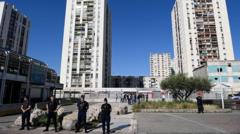Authorities in multiple French cities, including Nîmes, have taken proactive measures in response to a surge in violence associated with drug trafficking by instituting night-time curfews for minors. The latest city to implement such restrictions, Nîmes is positioning these measures as essential to shield under-16s from "exposure to violence" and curb the tensions tied to drug-related activities. Alongside the curfews, the authorities have announced the deployment of additional police units to handle the growing threat.
Recent incidents have highlighted the severity of the situation, including several daylight shootings and the discovery of a 19-year-old man’s burned body in proximity to Nîmes. In light of these occurrences, Mayor Jean-Paul Fournier remarked that conditions had become "untenable," attributing the climate of insecurity to the actions of drug traffickers. Other municipal leaders, like Deputy Mayor Richard Schieven, emphasized that the curfew aims to protect not only minors unassociated with the drug trade but also younger individuals vulnerable to exploitation by traffickers.
The city of Béziers has been enforcing a curfew for minors since the previous year, originally targeting those under 13 and recently expanding it to include individuals under 15 in certain regions. Mayor Robert Ménard reiterated a stance that children on the streets late at night are likely engaging in mischief rather than productive activities.
Despite these preventative measures, Béziers has continued to experience outbreaks of violence, including incidents where masked youths attacked police with fireworks. Limoges, another city implementing similar curfews for minors, faced a weekend disturbance involving around 100 individuals, causing Mayor Émile Roger Lombertie to question the efficacy of the measures in place; he noted the apparent inability to apprehend those involved.
The rise in drug-related violent crime is part of a troubling trend that has spread beyond traditional hotspots like Marseille, which has been known for its gang conflicts. Government statistics illuminate the alarming situation, reporting 110 deaths and over 300 injuries tied to drug-related violence within the year.
In response to the epidemic of drug violence, Justice Minister Gérard Darmanin and Interior Minister Bruno Retailleau have been vocal about the need for stringent measures. Earlier this year, they presented a comprehensive legislative package that included the establishment of maximum-security prisons for drug offenders, enhancement of prosecutorial resources, and increased protections for informants.
On a recent report, Darmanin noted that the initial 17 of France's most dangerous drug traffickers had been transferred to a high-security facility in northern France. The government’s crackdown has also faced backlash, with a series of arson attacks and gunfire at prisons earlier this spring being attributed to retaliatory actions from drug gangs against authorities.
Recent incidents have highlighted the severity of the situation, including several daylight shootings and the discovery of a 19-year-old man’s burned body in proximity to Nîmes. In light of these occurrences, Mayor Jean-Paul Fournier remarked that conditions had become "untenable," attributing the climate of insecurity to the actions of drug traffickers. Other municipal leaders, like Deputy Mayor Richard Schieven, emphasized that the curfew aims to protect not only minors unassociated with the drug trade but also younger individuals vulnerable to exploitation by traffickers.
The city of Béziers has been enforcing a curfew for minors since the previous year, originally targeting those under 13 and recently expanding it to include individuals under 15 in certain regions. Mayor Robert Ménard reiterated a stance that children on the streets late at night are likely engaging in mischief rather than productive activities.
Despite these preventative measures, Béziers has continued to experience outbreaks of violence, including incidents where masked youths attacked police with fireworks. Limoges, another city implementing similar curfews for minors, faced a weekend disturbance involving around 100 individuals, causing Mayor Émile Roger Lombertie to question the efficacy of the measures in place; he noted the apparent inability to apprehend those involved.
The rise in drug-related violent crime is part of a troubling trend that has spread beyond traditional hotspots like Marseille, which has been known for its gang conflicts. Government statistics illuminate the alarming situation, reporting 110 deaths and over 300 injuries tied to drug-related violence within the year.
In response to the epidemic of drug violence, Justice Minister Gérard Darmanin and Interior Minister Bruno Retailleau have been vocal about the need for stringent measures. Earlier this year, they presented a comprehensive legislative package that included the establishment of maximum-security prisons for drug offenders, enhancement of prosecutorial resources, and increased protections for informants.
On a recent report, Darmanin noted that the initial 17 of France's most dangerous drug traffickers had been transferred to a high-security facility in northern France. The government’s crackdown has also faced backlash, with a series of arson attacks and gunfire at prisons earlier this spring being attributed to retaliatory actions from drug gangs against authorities.




















